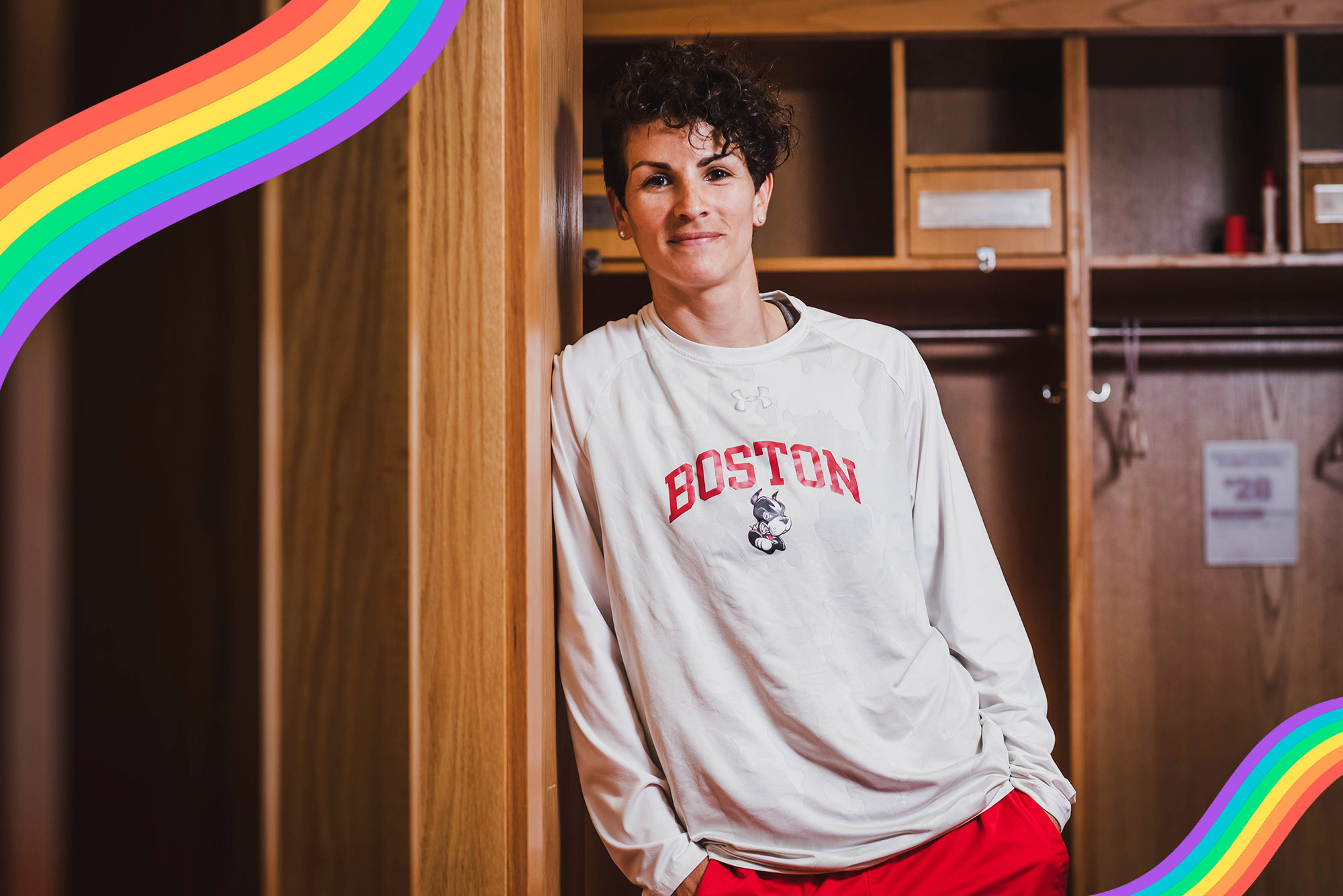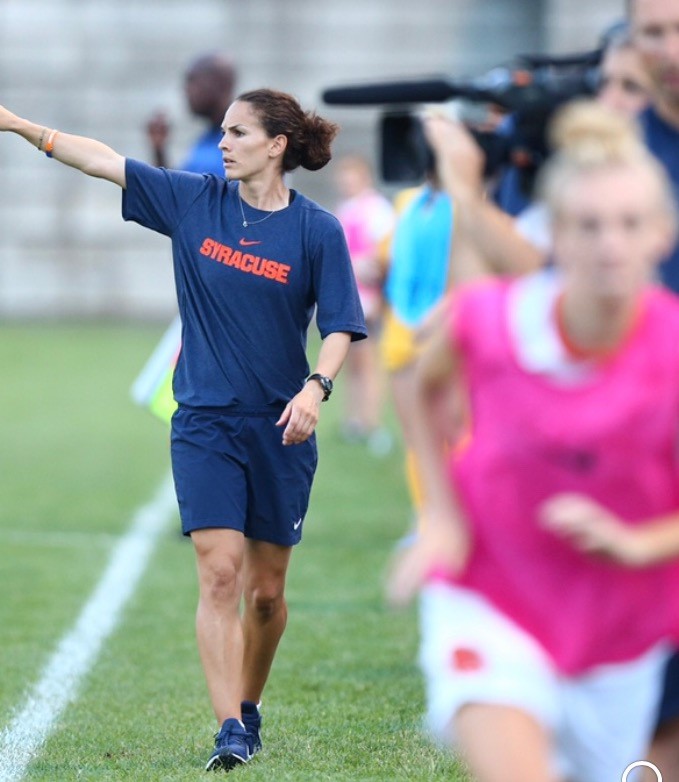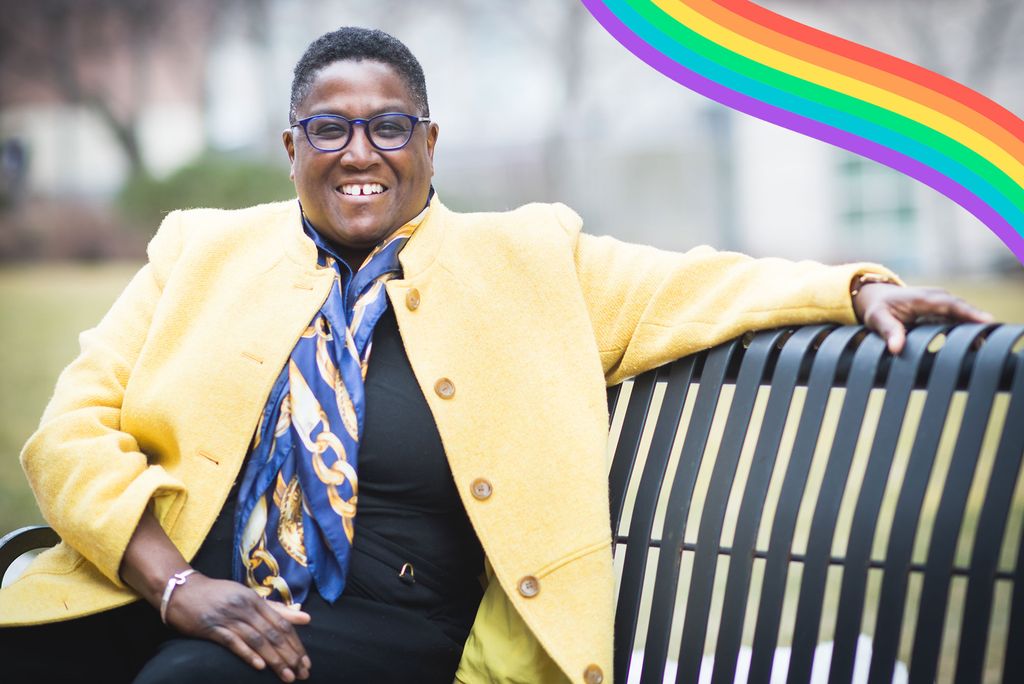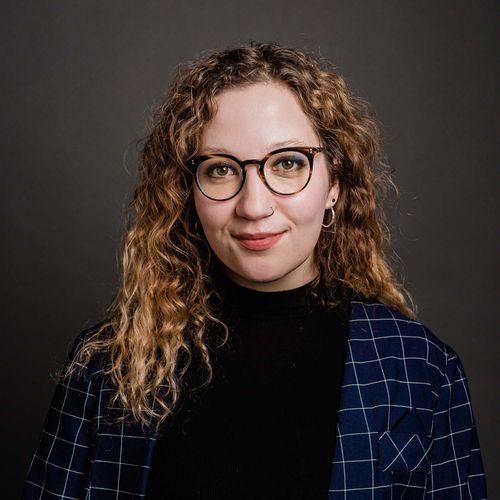My Coming Out Story: Kelly Lawrence

“I want the students I work with to know that there is nothing shameful about who they are. I’m proud of them, and I hope they learn to feel that pride, too,” says associate head women’s soccer coach Kelly Lawrence. Photo by Jackie Ricciardi
My Coming Out Story: Kelly Lawrence
Women’s soccer associate head coach on learning how to be herself
The BU Out List is a new directory of faculty and staff who identify as queer, trans, and/or nonbinary. A collaboration between the University’s LGBTQIA+ Faculty & Staff Community Network and Q, the student-run Queer Activist Collective, the Out List’s goal is to promote visibility, togetherness, mentorship, and resource-sharing among the BU community.
To mark the Out List’s release, BU Today is featuring a series of coming-out stories from list members, bringing you a different personal story each week during Pride Month. Up this week: Kelly Lawrence, women’s soccer associate head coach.

“You can’t be a role model”
I was fortunate enough to be a part of the English national team youth soccer setup as a kid. I got to play the sport I loved at the highest level. And I loved traveling to different countries to compete. As I started to move up the age groups and onto the U-17 and U-19 teams, the subject of sexuality started to surface. If you didn’t visibly have a boyfriend, you were labeled as gay—and it was made clear that that had negative connotations. But I hadn’t really explored my sexuality at that point; what was there to think? I mean, what even was “my sexuality”? I was just enjoying playing the game that I loved.
Eventually, I was accepted to Indiana University on a scholarship to play Division 1 soccer. I’m not sure I knew at the time that my decision to move continents for college was partly based on needing a break from wrestling with something inside of me saying, “yes,” while the world was saying, “no.”
In Indiana, not only did I get to play the sport that I loved, but I also found the greatest friends you could ask for. I found love and a sense of true self. Whenever I visit my friends in Indianapolis, I feel this sense of loss when I leave. Being in a room with people who understand you, accept you, and love you for all of you gives you a different level of self-confidence. I try to carry them with me wherever I am in the country. They have my whole heart.
Then came that first love that changed everything. At 19, I had come to know that I was at least bisexual. I wanted the people I loved to know, and when it came time to tell my family, they were great. I will never forget what my dad and brother said: “I’m bald, not blind,” and “Love is love.” I am especially lucky to have a family that loves and accepts me for who I am; my hope is that we can get there for everyone one day.

When graduation approached, I had no reason to suspect that my sense of true self would change. I was about to start a new chapter playing professional soccer, and ultimately would move on to a career in coaching. But once I entered the “working world,” I felt alone: moving from state to state for work, I lost (at least, proximity-wise) my support system, and with it my sense of community.
Coaching quickly became this precious passion to me. I wanted to be the very best that I could be, and I took being a role model extremely seriously. I didn’t anticipate being so worried about parents and players finding out I was gay; in college, it was just known. But at the time, I was so concerned about what parents would think, or that my young players would lose respect for me. I was unsure of how to be “Kelly, the gay female coach,” with what a lot of society was saying to me: “You can’t be a role model for all young girls if you’re gay.” And that was totally logical to my 23-, 24-, 25-year-old mind.
I found a clean break when I started working at Syracuse University in 2015. Initially, I didn’t speak about my personal life or sexuality. But as I became more visible about who I was, I saw student-athletes gain confidence and strength from my example. By being vulnerable, bringing up my girlfriend, and talking about my life—my whole life—I realized that I had the strength and courage to be proud of who I was, and that others could benefit from feeling this way, too.
One day, one of my student-athletes came to me for support. She needed to tell her story, and she identified me as a safe person to come out to. She would remember this conversation for the rest of her life as the first time she came out to someone.
All of the fears I had when I first got into coaching—of not getting jobs because I was gay, of kids not wanting to be coached by a gay coach—lost their power. And I realized I could do more. Almost immediately, I found myself wanting to advocate for our LGBTQ student-athletes. So I went to the athletic director and pitched programming to better support LGBTQ student-athletes.
I’ve sought out more opportunities since, such as being an ambassador for Athlete Ally, and working with our Terrier Athlete Ally chapter here within BU Athletics.
Being gay is a part of who I am, and it’s a pretty great part. I want the students I work with to know that there is nothing shameful about who they are. I’m proud of them, and I hope that they learn to feel that pride, too.
This Series
Also in
My Coming Out Story
-
June 28, 2022
My Coming Out Story: Vincent Stephens
-
June 22, 2022
My Coming Out Story: David Chard
-
June 15, 2022
My Coming Out Story: Chantel James


Comments & Discussion
Boston University moderates comments to facilitate an informed, substantive, civil conversation. Abusive, profane, self-promotional, misleading, incoherent or off-topic comments will be rejected. Moderators are staffed during regular business hours (EST) and can only accept comments written in English. Statistics or facts must include a citation or a link to the citation.